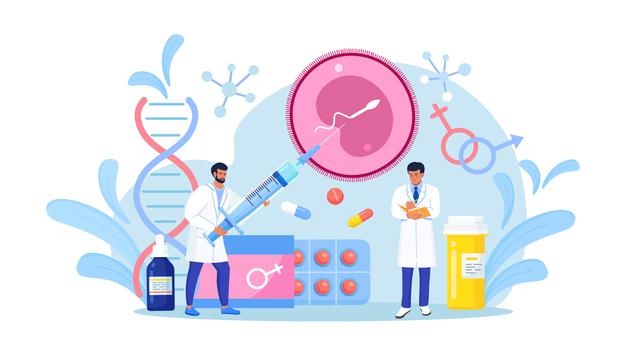Polycystic Ovarian Syndrome (PCOS) is an endocrine disorder affecting women of reproductive age. The condition is characterized by problematic periods – they are irregular, non-existent, and infrequent. Most women with PCOS have eight or fewer periods in a year. These are caused by cysts on the ovaries. They are minute sacs filled with fluids. They produce an abnormal level of androgens. In medical terms, this condition is called hyperandrogenism. It can affect the chances of ovulation in women. It may also result in oily skin, acne, and male pattern baldness in some cases.
Women with PCOS may experience a few of these symptoms
- Irregular periods
- Polycystic ovaries
- Excess level of androgens
- Thinning hair leading to baldness
- Infertility
- Insulin resistance
- Excess hair growth on the body
- Oily skin/acne
- Obesity
It is tough to point out the exact cause of PCOS. Experts believe that the condition is caused by a combination of factors such as genetics, lifestyle, and general health. In most cases, women are not even aware they have PCOS until they consult a gynecologist to treat their inability to conceive.
PCOS prevents the release of an egg which affects the ovulation process. When ovulation does not occur, women cannot conceive. However, if you are diagnosed with PCOS, it does not mean the end of the road for your motherhood dreams. You can still get pregnant with assisted reproductive treatments. You will have to deal with some challenges, and the treatment may take some time. It is difficult to provide a time frame for women with PCOS to get pregnant as the symptoms, and its severity may vary from one woman to another.
The PCOS And Pregnancy Connection
Women suffering from PCOS may have a higher than normal antral follicle count. This may happen to both ovaries. Women with PCOS may have a high level of androgens and other sex hormones, adversely affecting antral follicle growth. In such cases of hormonal imbalance, follicles fail to mature correctly and will not release an egg leading to anovulation. Anovulatory infertility is commonly seen in women with PCOS. Nearly 70 to 80 percent of women with PCOS have anovulatory infertility.
How to Improve Chances of Getting Pregnant Naturally with PCOS
PCOS symptoms are more pronounced in overweight or obese women. If you are overweight, it can lead to ovulatory dysfunction. Weight management can improve their chances of getting pregnant naturally. However, this is not easy as PCOS can result in weight gain in some women. They may also be at risk of developing severe health conditions such as heart ailments, hypertension, and gestational diabetes.
PCOS may also result in insulin resistance. The body will generate insulin normally, but its utilization may be impaired. Women with PCOS may develop Type 2 diabetes
Women with PCOS must be aware of their weight and health issues and address them before, during, and after pregnancy. Dietary regulations, exercise, and supplement support can help mitigate health risks. It can also help increase the chances of getting pregnant naturally despite having PCOS.
Fertility medications used in fertility treatment can also work for PCOS patients. When combined with lifestyle changes, it can help PCOS patients reduce the commonly seen symptoms. They can ovulate more regularly and become pregnant.
Laparoscopic Ovarian Drilling
Ovarian drilling is recommended for PCOS patients who are resistant to medications. It is a surgical process involving the use of a laser or needle to punch the membranes around the ovary. It helps the ovaries release an egg regularly and ensures regular menstrual cycles. Ovarian drilling is a one-time process and is a better option as it reduces the chances of multiple pregnancies caused by fertility drugs.
In Vitro Fertilization
In Vitro fertilization (IVF) is a highly effective treatment for PCOS patients as it offers a high success rate. IVF treatment provides the highest success rate. IVF is recommended to patients with tubal blockages or those with advanced age. It is also recommended for patients who have failed to respond to other PCOS treatments. You can consult the best IVF doctor in Mumbai to know more about this option.
The treatment involves removing eggs from the female ovaries and fertilizing them with sperm in a petri dish. It is developed inside a lab for a few days and then transferred to the female uterus, where it will grow as a normal pregnancy. IVF can be used alongside many other medications for PCOS to produce better quality eggs and create a more receptive uterine lining.
Dr. Nandita P. Palshetkar is a leading IVF specialist in Mumbai and has helped many women overcome their PCOS problems and become pregnant.

Be the first to comment on "How PCOS Affects Fertility And What Are Your Options"